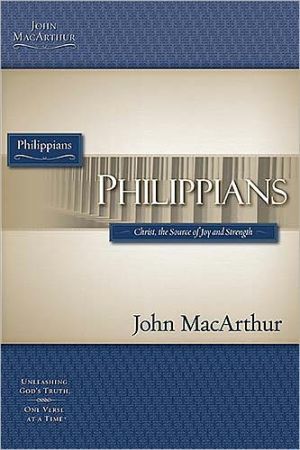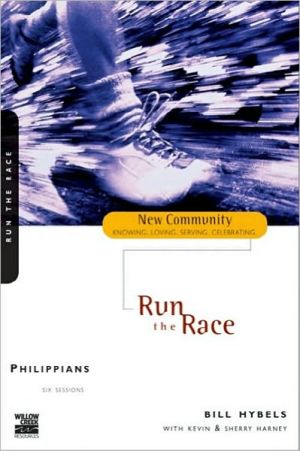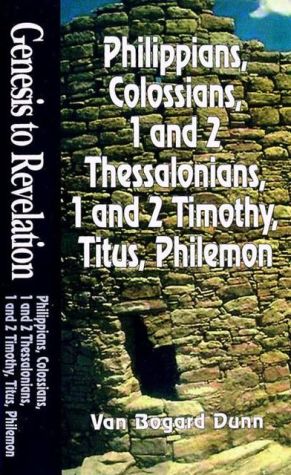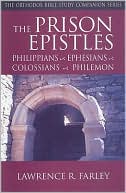Philippians
The book of Philippians is perhaps the most beautiful and cordial of Paul's many letters. Philippians: A Letter to Friends helps us understand how the book of Philippians calls each of us to live as followers of Christ.\ A Guided Discovery of the Bible The Bible invites us to explore God’s word and reflect on how we might respond to it. To do this, we need guidance and the right tools for discovery. The Six Weeks with the Bible series of Bible discussion guides offers both in a concise...
Search in google:
Created for both individual and group use, each six-week discovery guide focuses on a specific book of the Bible. Weekly sections feature key passages along with related questions that encourage adults to explore the Bible for themselves and learn how it applies to their daily lives. These guides are designed for busy adults who wish to deepen their relationship with God and strengthen their understanding of Scripture. This guide focuses on Philippians.
How to Use This Guide\ You might compare the Bible to a national park. The park is so large that you could spend months, even years, getting to know it. But a brief visit, if carefully planned, can be enjoyable and worthwhile. In a few hours you can drive through the park and pull over at a handful of sites. At each stop you can get out of the car, take a short trail through the woods, listen to the wind blowing through the trees, get a feel for the place.\ In this booklet we’ll read the letter of St. Paul to the Christian community at Philippi. Because the letter is short, we’ll be able to take a leisurely walk through it, thinking carefully about what we are reading and what it means for our lives today. Although the letter is short, it gives us a great deal to reflect on, for Paul packed it with a tremendous amount of insight into God’s love for us and the life he calls us to live.\ This guide provides everything you need to explore Philippians in six discussions—or to do a six-part exploration on your own. The introduction on page 6 will prepare you to get the most out of your reading. The weekly sections provide explanations that highlight what Paul’s words mean for us today. Equally important, each section supplies questions that will launch you into fruitful discussion, helping you to both investigate the letter for yourself and learn from one another. If you’re using the booklet by yourself, the questions will spur your personal reflection.\ Each discussion is meant to be a guided discovery.\ Guided. None of us is equipped to read the Bible without help. We read the Bible for ourselves but not by ourselves. Scripture was written to be understood and applied in the community of faith. So each week “A Guide to the Reading,” drawing on the work of both modern biblical scholars and Christian writers of the past, supplies background and explanations. The guide will help you grasp the message of Philippians. Think of it as a friendly park ranger who points out noteworthy details and explains what you’re looking at so you can appreciate things for yourself.\ Discovery. The purpose is for you to interact with this New Testament letter. “Questions for Careful Reading” is a tool to help you dig into the text and examine it carefully. “Questions for Application” will help you consider what these words mean for your life here and now. Each week concludes with an “Approach to Prayer” section that helps you respond to God’s word. Supplementary “Living Tradition” and “Saints in the Making” sections offer the thoughts and experiences of Christians past and present. By showing what this letter has meant to others, these sections will help you consider what it means for you.\ How long are the discussion sessions? We’ve assumed you will have about an hour and a half when you get together. If you have less time, you’ll find that most of the elements can be shortened somewhat.\ Is homework necessary? You will get the most out of your discussions if you read the weekly material and prepare your answers to the questions in advance of each meeting. If participants are not able to prepare, have someone read the “Guide to the Reading” sections aloud at the points where they appear.\ What about leadership? If you happen to have a world-class biblical scholar in your group, by all means ask him or her to lead the discussions. In the absence of any professional Scripture scholars, or even accomplished biblical amateurs, you can still have a first-class Bible discussion. Choose two or three people to take turns as facilitators, and have everyone read “Suggestions for Bible Discussion Groups” (page 76) before beginning.\ Does everyone need a guide? a Bible? Everyone in the group will need their own copy of this booklet. The booklet contains the entire text of Philippians, so a Bible is not absolutely necessary—but each participant will find it useful to have one. You should have at least one Bible on hand for your discussions. (See page 80 for recommendations.)\ How do we get started? Before you begin, take a look at the suggestions for Bible discussion groups (page 76) or individuals (page 79).\ A Warm and Challenging Friendship\ \ As Christians, we read the Bible for one reason above all: to deepen our knowledge of Jesus. True, the Gospels, which provide us with most of our scriptural evidence of Jesus’ life, account for less than half the total length even of the New Testament. Yet the Gospels are only one means of access to Jesus. The Old Testament forms the background for understanding Jesus. The writings that follow the Gospels in the New Testament convey what the early Church believed about him. Equally important, these New Testament writings show the transforming effect he had on his followers after his death and resurrection. This evidence of his impact on their lives helps us grasp not only who he is but also who he wishes to be for us.\ St. Paul’s letter to the Philippians gives us a vivid impression of the early Christians’ experience of Jesus. In this letter Paul speaks quite openly about himself, allowing us to glimpse his love for his Lord. Paul’s encouragements to the believers in Philippi are marked by a warmth that is unmarred by the reproaches he felt obliged to make in his letters to some other Christian communities. This is an openhearted letter, a letter between friends about their relationship with their mutual friend, Jesus.\ Someone said that Christianity is not so much taught as caught: we pick it up through contact with Christians. I am reminded of how I have learned about marriage. Much has come to me simply from being around married couples—first my parents and grandparents and aunts and uncles, then other couples over the years. I have learned about respect in marriage from hearing spouses speak to each other in tones of appreciation, even admiration, and without sarcasm. Some spouses have been living lessons in mutual trust. Some have demonstrated the possibility of enduring romance by their manner with each other even after decades of living together. Similarly, our relationship with Jesus can be nourished by hanging around Paul and the Philippians and observing how they relate to Jesus and to one another—how they pray for one another, how they support one another, how they are sensitive to one another’s feelings. We can find in this letter not only instructions about Christian beliefs but also an instructive picture of how Jesus was reshaping Paul’s and the Philippians’ lives.\ To grasp the spiritual dynamics of Paul’s and the Philippians’ lives, it is useful to have some idea of their circumstances and the events that led up to the letter. Here is a little background:\ Philippi was a city in northern Greece. In the first century, it was a Roman “colony.” This did not mean it was a settlement in a wild or thinly populated land. Roman colonies were cities that were established in well-populated districts in the empire and consisted of Roman soldiers and others with ties to the imperial regime. The colonies were designed to anchor their areas in loyalty to Rome. Many of the residents of the colonies held Roman citizenship, a privilege that belonged to only a small minority of people in the empire. The colonists followed Roman law and religion as though they lived in Rome itself. As a colony, Philippi was a kind of branch office of Rome, Inc., representing Roman interests in northern Greece.\ For a short time, Paul was a Jewish leader who persecuted the earliest Christian community in Jerusalem. A few years after Jesus’ death and resurrection, Paul received a vision of the risen Jesus that convinced him that Jesus is the promised Messiah who offers life in the Spirit not only to Jewish people but to everyone (Acts 9:1–19; 22:21). Paul first visited Philippi on a missionary trip around the year a.d. 50. As background for the letter, a narrative of Paul’s first visit to Philippi is included in our reading for Week 1. It is taken from the Acts of the Apostles, which was written by St. Luke, who apparently accompanied Paul in Philippi (page 13). Paul made many missionary journeys, planted churches, and stayed in touch with them by letters, several of which have survived and are included in the New Testament.\ We do not know how long Paul stayed in Philippi, but after he left, the Christian community there continued to grow, even though the Christians faced opposition from their fellow townspeople. The community would sometimes send Paul financial support for his missionary travels (see 2 Corinthians 8:1–4; the Philippians are among the “Macedonians” Paul describes there).\ Paul writes to the Philippians while he is in legal custody awaiting trial. Since his Philippian friends know where he is and why he is being tried, he does not need to state these matters in the letter—to the frustration of later readers, who have been left to conjecture about Paul’s whereabouts and the timing of the letter. Scholars have proposed various theories, the most satisfactory of which is that he is in Rome, toward the end of the period of detention described in Acts 28:16–31. (We will read an excerpt from this account in Week 2—page 23.) As he writes, Paul is nearing the end of some four years of custody. The date is a.d. 61, give or take a year.\ It seems that Paul is not being held in excessively severe conditions. Acts pictures him under house arrest. He is allowed to receive financial gifts and have visitors. At the same time, he is not a prominent or powerful person whose social connections might protect him from all the disagreeable aspects of detention.\ In general, the Roman state did not supply necessities to prisoners. It was up to their family and friends to provide them with food and clothing. So Paul must have been glad when a man named Epaphroditus, a member of the Christian community in Philippi, arrived in Rome with a financial gift from the Philippians. In those days, the trip from Philippi to Rome was hardly a snap, although it was relatively uncomplicated by ancient standards. The traveler, typically on foot, would proceed west from Philippi on the Roman main road for a couple of hundred miles, would cross the Adriatic Sea by ship, and would then complete an equally long stretch of road north through Italy—about forty days’ travel, one way. It seems that Epaphroditus became seriously ill en route and almost died after reaching Rome.\ This brings us to our letter. Paul is writing to the Philippians to thank them for their financial support and to commend Epaphroditus, who is returning to Philippi bearing the letter. Naturally, Paul includes news about himself, as well as advice, warnings, and encouragements.\ The Philippians’ situation cannot be reconstructed in detail. This is due to a lack of historical sources. But we can make some inferences from the letter itself. The Philippians are facing several challenges:\ External opposition. As Christians, the Philippian believers recognize Jesus as “Lord” and “Savior” (2:11; 3:20; all references are to Philippians unless otherwise noted). This puts them at odds with their city, which as a Roman colony prides itself on its loyalty to Caesar, who is called “lord” and “savior”—titles that express political and religious commitment. Christians’ refusal to worship the emperor as divine looks like political disloyalty. Pagan residents of the city would see Christianity, with its different Lord and its legally unrecognized network of loyalties, as a blot on their city’s special relationship with the imperial government. At this point there is no indication that any of the Christians are facing martyrdom. More likely they are experiencing social and economic pressures from their pagan relatives, friends, clients, customers, business colleagues, masters (almost certainly some members of the community are household slaves), and government officials (1:28–30).\ Internal friction. Paul’s appeals for unity and harmony (1:27; 2:1–2, 14) suggest that the community’s cohesion is threatened. At one point he specifically begs two of the leading women in the community to be reconciled with each other (4:2). How serious is the problem? Biblical scholar Peter O’Brien observes that “there is no severity of censure in Paul’s words, and this suggests that the divisions or dissension had not yet reached an acute stage. Yet the frequency and urgency of the apostle’s appeals imply that the danger of disruption was real.” Paul is concerned enough that he is willing to forego the presence of his right-hand man, Timothy, in order to find out how things are going with the Philippians (2:19).\ Misguided Christian-Jewish missionaries. Because of its location on a main road, Philippi is undoubtedly visited by travelers spreading various brands of Christianity. The Philippians probably offer hospitality to all and sundry. Some of the missionaries argue that Christians from a pagan background, such as the Philippians, need to complete their conversion to God by becoming Jews and keeping the whole Mosaic law, including the rules of dietary and ceremonial purity, the Sabbath, and male circumcision. As we will see in the guides to the reading (and the brief essay on page 74), the approach of these Judaizing Christian missionaries was a serious problem. It is not certain that any of these missionaries are present in Philippi as Paul writes, but he knows of the danger from his work with other local churches. We can infer the importance of the problem in Paul’s mind from the fact that he devotes a considerable portion of the letter to making a case against these missionaries (chapter 3).\ Meanwhile at Rome, many Christians are becoming more outspoken in their efforts to make Jesus known to the people around them (1:14). But clouds of persecution are gathering on the horizon. The Romans had mixed feelings about foreign religions and sometimes resisted introduction of them into their city. They regarded imported religions as “superstitions” and feared they would jeopardize the relationship between Rome and its gods that made the city secure. Within three or four years of Paul’s writing to the Philippians, a great fire will ravage the city of Rome. Rumors will spread that the emperor Nero set the blaze to clear the way for his personal building projects. To deflect these suspicions from himself, Nero will make the Christians scapegoats. Some of the Christians in Rome whom Paul commends in his letter for their evangelistic efforts will be swept away in a savage persecution.\ And what of Paul? It is likely that he was released soon after completing the letter. Possibly he then traveled east for a visit to Philippi and other cities where he had founded Christian communities. According to a well-founded tradition, he returned to Rome (biblical scholar Jerome Murphy-O’Connor surmises he went back to support the Roman Christians who were suffering persecution). Before long, Paul was seized and executed. His martyrdom and that of Peter at about the same time in Rome made the city one of the earliest places of Christian pilgrimage, as believers came to pray at the tombs of these two great leaders of the early Church.\ Paul’s letter to the Philippians poses a challenge to us. The Christians in Philippi were deeply committed to advancing the gospel, even at great personal cost. Most of us would admit that we do not live at their level of faith and self-sacrificing service to others. We might honestly say that we are not sure we want to have our lives centered so completely on Jesus and his cause in the world. Reading Philippians is like meeting a saintly person: you find something about the person very appealing, yet also very disturbing, for even without the person saying a word, the person’s life confronts you with the question “Why shouldn’t you be a saint too?”\ If you feel this kind of disturbance as you read Philippians, don’t brush it off. Maybe it is a sign of the Holy Spirit. If you wonder how to respond constructively, you will discover much in the letter that will aid your reflection. Paul urges us to set Jesus as the goal of our lives and to direct everything toward him, and Paul offers himself as a model. “Forgetting what lies behind and straining forward to what lies ahead, I press on toward the goal for the prize of the heavenly call of God in Christ Jesus” (3:13–14). Yet Paul emphasizes that our striving for Jesus is only a response to God’s grace. God “has graciously granted . . . the privilege . . . of believing in Christ” (1:29). God is at work in us, enabling us “both to will and to work for his good pleasure” (2:13). It is God’s power, displayed in Jesus’ resurrection (3:10), that will make us be as he is (3:21).\ Paul is well aware that responding to Christ is not a single event but a lifelong process. He prays for the Philippians to grow “more and more” in love (1:9). He recognizes that he himself has not arrived in the spiritual life (“not that I have already . . . reached the goal”—3:12). As for the Philippians, although they set a high standard of laboring for Christ, they too have a ways to go. At the moment of Paul’s writing, two of their most stalwart members are locked in conflict with each other (4:2–3).\ The Christian life, whether in first-century Philippi or in twenty-first-century Fresno, is empowered by Christ. Because Christ has made us his own (see 3:12), whatever the challenges we face or the weaknesses we confront in ourselves, we can “rejoice in the Lord” (4:4).\ \ \ Week 1\ A Lot to Be Thankful For\ \ Questions to Begin\ 15 minutes Use a question or two to get warmed up for the reading.\ \ 1 To whom are you especially grateful for help in a time of need?\ 2 Have you ever lived through an earthquake? If not, what memorable disaster have you experienced?\ \ Opening the Bible\ 5 minutes Read the passage aloud. Let individuals take turns reading paragraphs.\ \ The Reading: Acts 16:13–40; Philippians 1:1–11\ The Beginnings of the Church in Philippi Acts 16:13 On the sabbath day we went outside the gate by the river, where we supposed there was a place of prayer; and we sat down and spoke to the women who had gathered there. 14 A certain woman named Lydia, a worshiper of God, was listening to us; she was from the city of Thyatira and a dealer in purple cloth. The Lord opened her heart to listen eagerly to what was said by Paul. 15 When she and her household were baptized, she urged us, saying, “If you have judged me to be faithful to the Lord, come and stay at my home.” And she prevailed upon us.\ 16 One day, as we were going to the place of prayer, we met a slave-girl who had a spirit of divination and brought her owners a great deal of money by fortune-telling. 17 While she followed Paul and us, she would cry out, “These men are slaves of the Most High God, who proclaim to you a way of salvation.” 18 . . . But Paul, very much annoyed, turned and said to the spirit, “I order you in the name of Jesus Christ to come out of her.” And it came out that very hour.\ 19 But when her owners saw that their hope of making money was gone, they seized Paul and Silas and dragged them into the marketplace before the authorities. 20 When they had brought them before the magistrates, they said, “These men are disturbing our city; they are Jews 21 and are advocating customs that are not lawful for us as Romans to adopt or observe.” 22 The crowd joined in attacking them, and the magistrates had them stripped of their clothing and ordered them to be beaten with rods. 23 After they had given them a severe flogging, they threw them into prison. . . .\ 25 About midnight Paul and Silas were praying and singing hymns to God, and the prisoners were listening to them. 26 Suddenly there was an earthquake, so violent that the foundations of the prison were shaken; and immediately all the doors were opened and everyone’s chains were unfastened. 27 When the jailer woke up and saw the prison doors wide open, he drew his sword and was about to kill himself, since he supposed that the prisoners had escaped. 28 But Paul shouted in a loud voice, “Do not harm yourself, for we are all here.” 29 The jailer called for lights, and rushing in, he fell down trembling before Paul and Silas. 30 Then he brought them outside and said, “Sirs, what must I do to be saved?” 31 They answered, “Believe on the Lord Jesus, and you will be saved, you and your household.” 32 They spoke the word of the Lord to him and to all who were in his house. 33 At the same hour of the night he took them and washed their wounds; then he and his entire family were baptized without delay. 34 He brought them up into the house and set food before them; and he and his entire household rejoiced that he had become a believer in God.\ 35 When morning came, the magistrates sent the police, saying, “Let those men go.” . . . 40 After leaving the prison they went to Lydia’s home; and when they had seen and encouraged the brothers and sisters there, they departed.\ A Decade Later, a Letter to the Philippians Philippians 1:1 Paul and Timothy, servants of Christ Jesus,\ To all the saints in Christ Jesus who are in Philippi, with the bishops and deacons:\ 2 Grace to you and peace from God our Father and the Lord Jesus Christ.\ 3 I thank my God every time I remember you, 4 constantly praying with joy in every one of my prayers for all of you, 5 because of your sharing in the gospel from the first day until now. 6 I am confident of this, that the one who began a good work among you will bring it to completion by the day of Jesus Christ. 7 It is right for me to think this way about all of you, because you hold me in your heart, for all of you share in God’s grace with me, both in my imprisonment and in the defense and confirmation of the gospel. 8 For God is my witness, how I long for all of you with the compassion of Christ Jesus. 9 And this is my prayer, that your love may overflow more and more with knowledge and full insight 10 to help you to determine what is best, so that in the day of Christ you may be pure and blameless, 11 having produced the harvest of righteousness that comes through Jesus Christ for the glory and praise of God.\ Questions for Careful Reading\ 10 minutes Choose questions according to your interest and time.\ (The questions refer only to the reading from Philippians.)\ \ 1 Paul is thankful (1:3). What exactly does he thank God for?\ 2 Who began the good work in verse 6? What work did he begin?\ 3 Identify Paul’s references to Jesus in this passage. What does his frequent mention of Jesus suggest about Paul and his relationship with the Philippians?\ 4 If you knew nothing about Paul, what impression of him would you get from this section of his letter?\ 5 In everyday terms, what does it mean to live “for the glory and praise of God” (1:11)?\ A Guide to the Reading\ If participants have not read this section already, read it aloud. Otherwise go on to “Questions for Application.”\ \ Acts 16:13–40. The excerpt from Acts tells how the Christian community in Philippi began and introduces its first members—Lydia and her household and the director of the city’s jail and his family. Paul does not single them out in the letter we are about to read. But they are probably present when his letter arrives and is read aloud at the community’s weekly meeting. Possibly the community is still gathering in Lydia’s home (verse 40).\ Philippians 1:1–2. Some ten to twelve years have passed since the events in Acts 16. Paul now writes from Rome to the Christians in Philippi. He addresses “the bishops and deacons” (or “overseers and ministers”) in particular, for they will have a special responsibility to lead the community in responding to his instruction. But he will not mention the leaders again. Paul writes to the whole community (count the instances when he speaks of “all” and “every” member in this week’s reading alone). Each member of the church in Philippi—and each of us—must pay attention to his message and put it into practice.\ 1:3–5. At this point, an ancient letter-writer would offer a wish for the recipient’s well-being—usually a quick “I hope everything’s okay with you” (3 John 2 is an example). The length of Paul’s report on his hopes for the Philippians (1:3–11) is a measure of his friendship with them.\ Paul thanks God not mainly for what the Philippians have done for Paul but for what they have been doing with Paul for Christ. They have been “sharing” in the gospel (1:5). The Greek word means “participation”; the Philippians have been taking part with Paul in the Christian mission. The “gospel” here means the announcing of the message about Jesus. (The “first day” [1:5] of the gospel was the initial announcement of Jesus in Philippi that we just read about in Acts 16.) Thus Paul is not saying merely that the Philippians accepted the message about Jesus but that they have been working actively to bring this message to others. After Paul left Philippi, the Philippians continued to communicate with people about Jesus, even though they themselves had become Christians only recently. One scholar remarks, “This text provides a fine biblical example of the ‘apostolate of the laity.’”\ 1:6. While Paul is glad for the Philippians’ efforts, he knows that Christian life springs from a source deeper than human determination. Our service to God is an outgrowth of God’s “good work” in us. God both initiates the good we do and brings it to accomplishment.\ 1:7–8. (These verses are a kind of parenthetical addition. Try skipping them at first, reading directly from verse 6 to verse 9.) “Because you hold me in your heart” could also be translated “because I hold you in my heart.” Paul and the Philippians are fond of each other because they have the experience of “being in this Christian-mission thing together.” The Philippians have been loyal to Paul during his imprisonment, even though it was an embarrassment to them. But notice that Paul has confidence that God will complete his work in them (1:6) not primarily because of their labors or their loyalty to Paul but because they “share in God’s grace.” Paul’s hope is based not on their faithfulness but on God’s.\ 1:9–11. Paul resumes his report on his prayer for the Philippians that he began in verses 3 and 4. He hopes that they will live in expectation of the coming of God’s kingdom. “Paul’s prayer is that they might live the life of the future in the present,” comments New Testament scholar Gordon D. Fee. For most of us, the final coming of God’s kingdom seems so far off that we find it difficult to orient our lives toward it. But Paul points out the incremental means by which we can direct our lives toward God’s kingdom—by growing in love. If we grow in love, we will increasingly be able “to determine what is best” (1:10). This means more than knowing which job to take or what to cook for dinner. It means being able to discern what is important, having insight into what really counts, grasping what is essential for living toward God’s kingdom. By growing in love, we will be able to see life more and more from an eternal perspective—from God’s point of view. Plus, if we grow in love, we will have “knowledge” and “insight” (1:9)—the practical good judgment to know how to handle the various situations we face. We will become fruit trees heavy with fruit (1:11).\ Questions for Application\ 40 minutes Choose questions according to your interest and time.\ \ 1 How might Paul’s prayer for the Philippians be a model for your prayer for your children or other members of your family? for the people in your parish? for others?\ 2 Compare yourself with Paul in verse 8. Do you tend to forget about people who need you to stay in touch with them? Who? What should you do about this?\ 3 In verse 9, Paul speaks of a connection between love and knowledge. Would Paul agree with the popular saying that love is blind? In what ways is love blind? In what ways does love help a person see more clearly?\ 4 Paul prays that the Philippians’ love would “overflow more and more” (1:9). What does it mean for love to overflow? Where do you unconsciously or consciously draw the line and say to yourself, “I am not going to love more than that”? Where is God inviting you to let love overflow?\ 5 Paul was able to look beyond his own needs and encourage other people even when he was in a difficult situation. Who have you known like this? What can you learn from that person?\ 6 In what ways do you participate in bringing the gospel to other people? How does your parish do this? What step could you and your parish take to do it more?\ 7 In what area of your life is verse 6 a word for you? What does it say to you? What could you do to keep this word in mind in that situation?\ \ Accept the fact that you do not know much. Being “biblically challenged” is nothing to be ashamed of!\ Steve Mueller, The Seeker’s Guide to Reading the Bible\ \ Approach to Prayer\ 15 minutes Use this approach—or create your own!\ \ ♦ Read aloud this observation on this week’s reading from biblical scholar Gordon Fee:\ Paul . . . rarely thanks God for “things”; his thanksgivings are for people, for those special “gifts” whom God has brought into his life, who, despite whatever frustration or grief they may also cause him, are invariably a source of great joy and thanksgiving.\ Take a few minutes for parti-cipants—either silently or aloud, as they wish—to thank God for the people through whom he has touched their lives and is touching others’ lives, and to pray for those people.\ Pray an Our Father. Close by asking someone to read Philippians 1:6 aloud as a final blessing for the group: “I am confident of this, that the one who began a good work among you will bring it to completion by the day of Jesus Christ.”\ Saints in the Making A Short Course in Christianity\ This section is a supplement for individual reading.\ \ The cooperation between Paul and the Philippians in spreading the gospel has not always been imitated by later generations of Christians. In some periods, priests and religious have been not only the main agents for spreading the gospel, but seemingly almost the only ones. The twentieth century, however, saw a renaissance of evangelizing by laymen and laywomen.\ An instructive example of priests and laypeople working together in evangelization is a movement called the Cursillo, which originated in Spain in the late 1940s. A group of priests and young laymen on the island of Majorca became deeply concerned for fellow Catholics for whom Christianity seemed to make little difference in ordinary life. A businessman, Eduardo Bonnin; a theology student, Juan Capo; and a priest, Sebastian Gaya, developed a method of reaching out to these men and women. They targeted those who seemed to be the natural leaders in their everyday environments and invited them to a three-day evangelistic retreat: a short course—in Spanish, a cursillo—in Christianity. Through brief talks and personal stories, most given by laypeople, the weekend helped participants make contact with Jesus as a living person who was calling them to give their lives to him in service to others. Participants who experienced a conversion through the retreat were then linked together in a network of small groups in which they supported one another in being “apostles” to their social environments of business, government, education, and so on.\ During the forties and fifties, the Cursillo movement spread in Spanish-speaking countries; in the sixties it began to attract English-speaking Catholics in the United States. Over almost a half-century, the movement has profoundly affected thousands of men and women around the world, energizing them to take part in making Christ known in the many situations to which priests and religious have no entrée. The movement has experienced weaknesses as well as strengths, and in the United States it is smaller than it used to be. But the Cursillo movement continues to have an impact, and much can be learned from it. The national center of the movement in the United States can be contacted at (214) 339-6321 (www.natl-cursillo.org).
Contents\ 4 How to Use This Guide\ 6 A Warm and Challenging Friendship\ 12 Week 1\ A Lot to Be Thankful For\ Acts 16:13–40; Philippians 1:1–11\ 22 Week 2\ Don’t Worry about Me\ Acts 28:16–31; Philippians 1:12–26\ 32 Week 3\ Dual Citizenship\ Philippians 1:27–2:11; John 13:1–17\ 42 Week 4\ Comings and Goings\ Philippians 2:12–30\ 52 Week 5\ Focus on Jesus!\ Philippians 3:1–4:1\ 62 Week 6\ Thanks for the Gift\ Philippians 4:2–23\ 72 Not “Pay, Pray, and Obey”\ 74 Was Paul Anti-Jewish?\ 76 Suggestions for Bible Discussion Groups\ 79 Suggestions for Individuals\ 80 Resources







